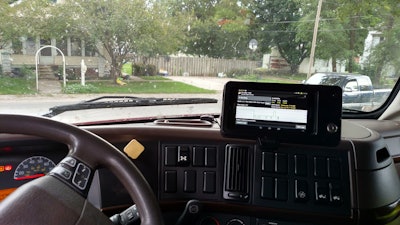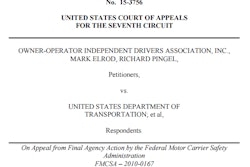
The rule will in short, FMCSA says, improve hours of service compliance and prevent 1,844 crashes a year and save 26 lives annually. Moreover, the agency contends its rule does not violate truckers’ constitutional rights to privacy, as the Owner-Operator Independent Drivers Association charges in its lawsuit.
Relative to ELDs potential to infringe on truckers’ privacy, FMCSA argues that’s simply part of being a truck driver. Trucking has a “‘long tradition of close government supervision,’” the agency says, citing the 1987 court decision New York v. Burger. Truckers should have a lower expectation of privacy while on the job, FMCSA’s lawyers argue in the brief, because trucking is such a highly regulated industry.
Given that ELDs are meant to track only hours of service compliance, they infringe on truckers’ rights no more than keeping paper logs does, the agency argues in its court filing.
The alleged infringement on drivers’ 4th Amendment protections against illegal search and seizure — which OOIDA says is inevitable with the tracking requirements spelled out in the ELD mandate rule — is one of the association’s principal arguments against the ELD mandate.
All truck operators (with a few notable exceptions) who are required to keep records of duty status currently will be required to use an ELD under the mandate by December 18, 2017, to track hours compliance.
OOIDA’s challenge, however, intends to overturn the ELD requirement. The association successfully challenged the agency’s prior mandate. Its new lawsuit will be heard by the same court that ruled to overturn the agency’s 2010-published attempt at an electronic logging devices mandate.
FMCSA had 60 days to file a response to OOIDA’s complaint, but it received a two week-extension, giving the agency and its legal team until June 15 to file a brief with the court.
The agency distilled its arguments for the mandate into six key points:
- The rule was required by Congress, the agency says. The mandate requires nothing further than what Congress asked of the agency, FMCSA argues.
- ELDs are more reliable at tracking hours of service than paper logs and will “increase compliance” with hours regulations, the agency says.
- The agency has shored up the trucker harassment concerns that caused the court the toss out the prior ELD mandate, FMCSA says.
- The rule will reduce crashes, according to FMCSA’s cost-benefit analysis.
- Drivers’ personal data and records are protected in adjudication processes, including when drivers file complaints against carriers.
- ELDs do not violate illegal search and seizure protections.
All six points are in response to arguments made against the mandate by OOIDA, who says the rule violates truckers’ privacy, because ELDs are required to track drivers within a one-mile radius while they’re on duty. OOIDA also argues the mandate will not enhance safety, still opens the door for harassment and coercion of truck drivers and does not adequately protect drivers’ records.
Overdrive will post more on FMCSA’s filing and its arguments for the rule this week and next.









